- Home
- Peter Ackroyd
Chatterton Page 10
Chatterton Read online
Page 10
‘Vivien’s working late.’
‘In durance vile, no doubt.’ He ushered his old friend into a barely furnished room. ‘This is the inner sanctum,’ he said apologetically. ‘Can I tempt you?’
‘Excuse me?’
‘Nunc est bibendum?’
‘What?’
‘A drinkie?’
Charles asked for a vodka martini, a choice which surprised him even as he made it. Although they had only been in each other’s company for a few seconds Flint retreated to the kitchen with a feeling of relief and, before bringing the drink to Charles, he consulted a small card on which he had written down a list of topics for conversation. It read, ‘Job, Poetry, The Past’; the first one sprang to his lips when he entered the room, bearing two glasses on an expensive beaten copper tray. ‘So tell me about your occupation, Charles. Or are you preoccupied? Is the labourer still worthy of his hire?’
‘There’s nothing to say, really.’
Mentally, Flint scored a line through ‘Job’; it was clear that Charles did not have one. ‘And what does anyone do in particular? Mutatis mutandis, of course.’
‘Of course.’ There was a slight pause. ‘Except that you’re a success.’ Charles said this as easily as he could bear.
‘Not uncommon in the metropolis, alas. And, horribile dictu, generally a temporary phenomenon.’ Whenever Flint’s eyes seemed in danger of meeting those of Charles, they swerved away.
This made Charles uneasy, also. ‘Do you still write poetry, Andrew?’ They had met at a poetry reading in the basement of a Cambridge college; in the course of a long and drunken evening, they had discovered their mutual enthusiasm for certain contemporary French writers and as a result had decided to become friends.
‘Hélŕs, non. Departed. The Muse has taken her claws from my shoulder, if I may use a personification.’
‘Why not? It’s a free country.’
‘Ah, a libertarian. Do you read Burke?’ But Flint had noticed the irritation in his voice, and now said more gently. ‘But what have we here?’ He pointed to a brown envelope which Charles had placed on a small glass table by his chair. ‘Have you composed a poem?’ His tone was not as enthusiastic as it had once been.
‘No, not a poem.’ In fact Charles had brought with him a page of the Chatterton manuscript, and now he took it out to show Flint. ‘I was wondering,’ he said, ‘if you could tell me its…’ He could not think of the word he needed.
‘Provenance?’ At university, Flint had studied manuscript material of this kind.
‘I remember you were interested in graph…’
‘Palaeography?’ Flint took the page from Charles and held it up to the light of a sculptured Italian lamp placed casually on a perspex stand in the corner of the room. ‘The Durham lily,’ he said.
‘Like the Jersey lily?’
‘No.’ He was too interested to laugh. ‘A watermark, actually. Distinct and unassuageable. Do I mean unassuageable? I don’t believe I do. Do I mean ineradicable?’ All the time he was examining the handwriting of this document carefully. ‘It’s an English round hand,’ he said at last, ‘but there are definite traces of an ornate schoolroom script. You can tell that from the ascenders. And here, in extenso, a secretary hand too.’ Charles seemed puzzled. ‘It was perfectly common, you know, for the same person to compose in more than one style. Think of the Bishop of Tewkesbury. Or perhaps, on second thoughts, don’t. He was a Socinian, I believe.’ Charles seemed even more puzzled. ‘My amabilis insania. Don’t worry, I have passed the contagious stage. And, oh look, a magnificent minuscule! This must be the work of an antiquarian.’
‘I know.’ Then Charles went on, pleasantly, ‘I have a date. I just want to see if you agree.’
‘The headlong rush, it seems.’ But Flint was enjoying the use of his skills. The punctuation and the capitals have been rationalised but, on the other hand… Is that a pun? Gracious me. On the other hand, there is no real contrast between the thick and the thin strokes. Do I dare to give a date?’ His old friend said nothing, and Flint was forced to continue, ‘Yes, I dare. Experto crede, dear Charles, and not me. But I would suggest before 1830 ’
‘Exactly.’ He nodded, as if he had analysed the same evidence and was waiting only for Flint to confirm it.
‘ and since the Durham watermark was not in use until 1790…’
‘Early nineteenth century! I knew it!’ Charles lifted his glass, and drained the vodka from it.
Flint handed back the manuscript. Tell me more.’
There was a time when Charles would have explained everything to him, and together they would have exulted in this extraordinary discovery, but now he held back. He did not really know his friend any more. ‘I will,’ he said, ‘I will when I can.’ But he was embarrassed by his own discretion, and looked down into his empty glass.
‘Attempt a second drink.’ Flint had only been mildly curious in any case and, sensing Charles’s unease, gratefully disappeared into the kitchen with the empty glasses. He consulted his list of topics, and put a small tick against ‘Poetry’. ‘Can I take it,’ he asked as he returned into the room, ‘that the laurel wreath is still somewhere on your brow?’
‘What?’
‘Are you still writing poetry?’
‘Yes. Of course.’ Charles seemed hurt by this question. ‘I thought you might have seen my latest book.’
‘Mea culpa ’ Flint blushed.
‘But I’ve got plenty of time,’ Charles added, quickly. He cocked his head to one side, a gesture which Flint remembered very well. ‘I’m in no hurry.’ The movement of his head had provoked a sudden pain, and he shifted uneasily in his seat. ‘I’ve got all the time in the world.’
‘Patience is certainly a prerequisite for the serious artist, although sometimes it can acquire the quality of ’
‘Can I have another drink?’ Charles had swallowed the rest of his vodka, wanting to drown the pain, and now he held out his glass eagerly.
‘Thirsty work, I take it?’ Flint was happy to retire to the kitchen yet again; he drew a line through ‘Poetry’ and, when he returned with two more drinks, launched into his third subject, ‘The Past’. The years are incorrigible, aren’t they? They never cease. Was it Tennyson who said that? No. Horace. It was Horace Walpole.’ He looked up to see if Charles had caught his joke, but he was staring ahead at the wall. ‘It only appears like yesterday when ’ he hesitated, not having prepared a specific example; Charles looked at the wall steadily as Flint took another large swig: ‘ when we were young. No longer the juvenile leads, I know, but where are we being led? What is the prognosis, physician?’
‘I never have any trouble,’ Charles replied, glancing at Flint.
‘I’m just fine.’ The pain was going but, unaccustomed as he was to vodka, he was feeling a little confused. ‘But what about you?’ he went on. ‘What have you been doing recently?’
‘No comment.’ Flint was rubbing his eyes, looking blearily around the room when he had finished. ‘I mean, I have considerable difficulty. Difficulty in ’ It was not just that he was unwilling to talk about himself: he seemed unable to do so.
Charles had not realised this. ‘But what are you working on now? After the novel?’
Flint scratched his face, and then examined his fingernails for evidence of dead skin. ‘I’m writing the biography of George Meredith,’ he said, quickly, ‘the English poet and novelist.’
Charles, now feeling more comfortable, stretched out in the chair. ‘I knew you had it in you.’ For a moment he enjoyed the luxury of pretending that they were both back at university, with Charles himself still in the ascendant. ‘You were the one who worked hard. You were always ambitious.’ This surprised Flint, who did not realise that he possessed any marked characteristics at all. ‘I’m very pleased for you.’ And at this moment, as it happened, Charles was.
‘Oh no,’ Flint cried, suddenly animated by the vodka. ‘I’m just a hack!’ He looked at Charles for a reaction.
‘I’m just a fraud. Did I sell out? Did I compromise?’ He seemed elated at the thought.
Charles drained his glass and made a point of gazing at Flint very seriously, although his eyes seemed to have some difficulty in focusing on him. ‘Do you want me to justify you to yourself? Is that it?’
‘No, nothing. I want nothing!’ Flint lost the thread of whatever it was he had intended to say. ‘I admire you, Charles. Charlie. You adhered to the poetry. You haven’t changed!’ Charles was delighted at these sentiments, but Flint’s enthusiasm disappeared as quickly as it had come, and he lapsed into pensiveness. ‘But in the long run,’ he muttered, ‘it doesn’t matter, does it?’
‘You mean because, in the long run, we’re dead?’
Flint nodded gloomily. ‘Do you know,’ he went on, animated once more. ‘Do you know, there are times when I go through that door.’ He waved in the general direction of that object. ‘When I go through that door, and I think to myself. I think, well now, Andrew Flint Esquire, novelist and biographer, who’s to say you’ll ever come back again? Who’s to say you won’t be dead?’ He intoned the last word before getting up very quickly, rushing into the kitchen, ticking ‘The Past’ on his list and coming back into the room with the half-finished bottle of vodka. More drinks were poured. Charles was bowed over his glass, trying to remember what he wanted to tell his friend. ‘You’ve lived alone too long,’ he said. ‘You work too hard. You shouldn’t work too hard.’ He paused. ‘I’ve been married eleven years now.’ He stopped to consider his next thought. ‘It’s been fun.’
‘Yes, I know.’ Flint put out his hand to comfort him, and knocked over his glass.
‘And it does matter. It does matter. Think of them all around us, watching us, Blake, Shelley, Coleridge ’
‘And Meredith.’
‘ And Meredith. All of them influencing us.’ Flint looked suddenly depressed. ‘And do you know what, Andrew, do you want to know something? It’s a secret, but I can tell you. You’re a great friend. They got it all from Chatterton. Did you know that? I do.’
‘It wouldn’t surprise me.’ Flint seemed only vaguely interested in this piece of information, and suddenly he leaned forward. ‘It’s amazing how much money you can make out of writing. Do you want to know how much I got for my novel?’ Charles shook his head, and at this moment the pain returned. ‘Go on. Guess.’
‘I don’t want to.’
‘Go on. Be a sport.’
‘I really don’t want to know.’ Charles could not control the pain, and he felt a sensation very close to vertigo. He looked down and he noticed that the button on his left shirt-cuff was hanging only by a small thread. He clutched at it, but it fell to the floor.
‘Let me show you my word processor then,’ Flint was saying. ‘It cost a fortune.’
‘No, seriously ’
‘Come on. You’ll like it.’ Charles got up unsteadily, and Flint led him into his small office where a computer was perched upon his desk. ‘Four thousand pounds,’ Flint said proudly. He switched it on and, as a vague hum filled the room, he pushed three or four keys in succession; the word ‘Library’ appeared in the top left-hand corner and a series of Latin phrases passed across the screen, glowing with an amber light.
‘I have to go now,’ Charles was saying. ‘My wife ’
‘Oh, right. Yes. Of course. The happy family.’ The sight of the computer seemed to have sobered Flint a little, and he led Charles towards the front door of his apartment. ‘We must do this again soon.’ He looked away as he said this. ‘We really ought to keep in touch.’ Then he noticed the expression on Charles’s face and, with some alarm, he took hold of his arm. ‘How are you feeling?’
Charles leaned against the side of the door, thinking that he had heard the words, ‘I am your humble servant’. But he saw Flint looking at him anxiously, and murmured, ‘I’m fine. What did you say in the old days? It must have been the salmon.’ He felt the wall throbbing against him. ‘Do you remember the salmon?’
‘I’ll call you a cab. And don’t forget your manuscript.’ Flint went down into the street, and it was only when Charles was being led towards the taxi that he remembered he had very little money on him. But he allowed himself to be placed in the seat, and the door to be closed; he even managed to smile and wave as he was driven away.
Flint went up to his apartment, relieved that the meeting had come to an end. He washed the glasses carefully, threw away the now empty bottle of vodka, rearranged the chairs on which they had sat, and then went back into his study. He switched on his computer, and for a while he stared at the bright screen.
‘Stop!’ Charles said, about a mile from his own flat. And then he murmured, almost to himself, ‘I’m sorry. That’s all I can afford.’
He was about to pay when the driver opened the window. ‘That’s all right. Your friend took care of it.’ He drove off quickly.
And so Charles walked the rest of the way home. It was dark now and the streets were misty; the vapour wrapped itself around him and, when he looked down, it seemed that his limbs were covered with snow. But he was also treading on the mist, and his light steps had no echo. ‘There is a pain,’ he said out loud, ‘but it belongs to everyone.’ There was someone walking beside him who heard this, and who nodded in agreement; Charles turned to his invisible companion. ‘The dream unfolds,’ he said. ‘The sleeper awakes, but still the dream goes on.’ And he realised at once that these were not his words, but those of someone other.
Part Two
This ys mie formaunce, which I nowe have wrytte,
The best performance of mie lyttel wytte.
(To John Lydgate. Thomas Chatterton.)
Strayt was I carry’d back to Tymes of yore
Whylst the Poet swathed yet yn fleshlie Bedde
And saw all Actyons whych han been before
And saw the Scroll of Fate unravelled
And when the Fate mark’d Babe acome to Syghte
I saw hym eager graspeynge after Lyghte.
(The Story of Wyllyam Canynge. Thomas Chatterton.)
6
THESE ARE circumstances that concern my conscience only but I, Thomas Chatterton, known as Tom Goose-Quill, Tom-all-Alone, or Poor Tom, do give them here in place of Wills, Depositions, Deeds of Gift and sundry other legal devices. Take then the folowing Account for what it is, tho’ a Better, I believe, could not be given by any other Man: for who was present at my Birth but my own self, tho’ it may be that this was one of the few Occasions when my Mother had a better conception than my Mother-wit. I was born in Pile Street, in the month of April, in the year of Our Lord 1752, in the shit-hole of Bristol, in the sure and certain Hope of being revil’d, abus’d, contemn’d by the pious and admirable natives of that City who, like the Androcephalogoi, carry their Heads where their Pricks should be. My Father being dead, all around me at that time were Females, which fact may account (as I explained to my Mother, and made her quite Cry with Laughter) for my sudden Hysteric fits as a small Boy: for why should I, the great Parodist, not coppy the softer Sex? But if it were not the Females, then it was the Spleen which o’erwhelmed me. One of my first Satires, writ when I was seven years old, was upon this Topick.
My Father had been the singing master of St Mary Redcliffe, the which Church was opposite to our house in Pile Street and so close that I could number the very cracks in its Stone; and since he expir’d only three months before my own Birth, it has often occur’d to me that I must have heard his singing while I was yet in my mother’s Womb: hence my own love of Musick, even of the discordant Airs which waft from the Publick Gardens and leave me weeping. My Mother was a good woman, who never tired of instructing me in the Virtues and Qualities of my Father: ‘Your Papa,’ she would say, ‘so loved this Church he might have built it with his own Hands.’ Then she would sigh, and then she would laugh, putting down her Thread and Needle to embrace me. ‘Why so serious now?’ she would ask me as I gazed up at her, ‘Lord what a boy is this, to be swayed by hi
s Mother’s poor memories!’ In the evenings I would sit with her, and twine my Arms around her neck, as she told me old stories by the Fire. ‘Three hundred years ago,’ she would say, ‘the Church-steeple was struck by a Lightning rod and down it fell, rumbling among some cows in the neighbouring Field, where the Pie-shop and the Bookseller are now.’ Three hundred years ago! The words were like a Spell upon me: a time before my self, and even before my Father, this same Church stood here! I was but a small Boy then, and yet from those Dayes forward I haunted St Mary Redcliffe. Whenever I entered its Porch it was with bowed head; being a fantastic, forlorn and fickle little Fellow it seemed to me that I was entering my father’s own house (that in no Pious sense), and to my Fancy all the funerary monuments there became Images of him straitened in the death from which I wish’d to pluck him. So you see how I came to be so great a lover of Antiquity.

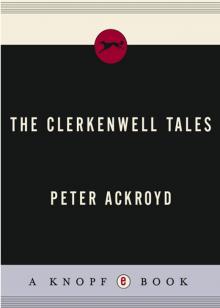 The Clerkenwell Tales
The Clerkenwell Tales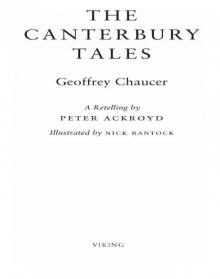 The Canterbury Tales
The Canterbury Tales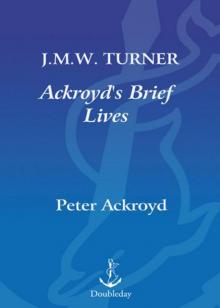 J. M. W. Turner
J. M. W. Turner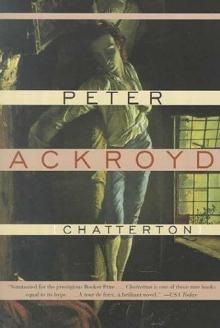 Chatterton
Chatterton The Canterbury Tales – A Retelling
The Canterbury Tales – A Retelling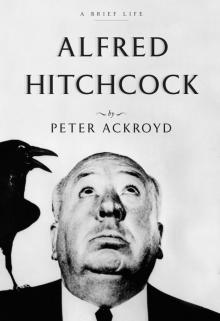 Alfred Hitchcock
Alfred Hitchcock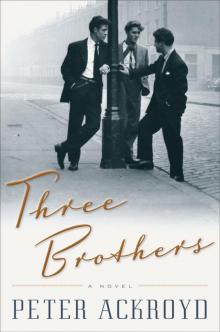 Three Brothers
Three Brothers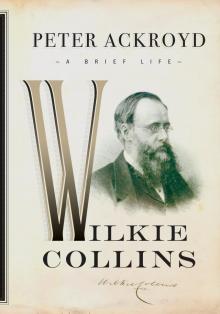 Wilkie Collins
Wilkie Collins Venice
Venice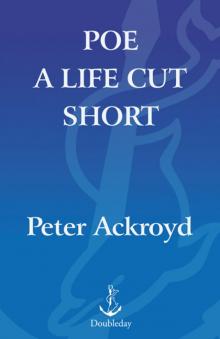 Poe
Poe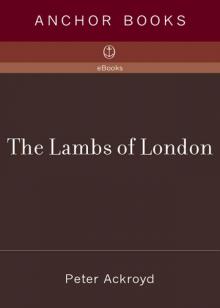 The Lambs of London
The Lambs of London London
London Queer City
Queer City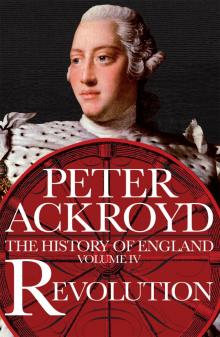 Revolution, a History of England, Volume 4
Revolution, a History of England, Volume 4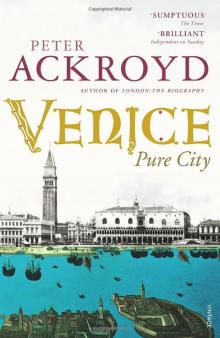 Venice: Pure City
Venice: Pure City Foundation
Foundation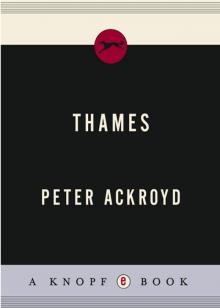 Thames
Thames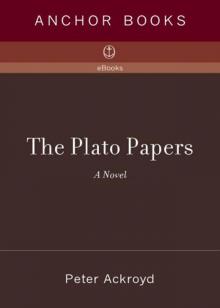 The Plato Papers
The Plato Papers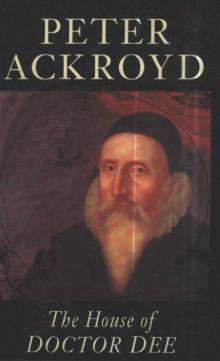 The house of Doctor Dee
The house of Doctor Dee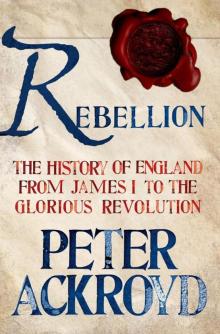 Rebellion: The History of England from James I to the Glorious Revolution
Rebellion: The History of England from James I to the Glorious Revolution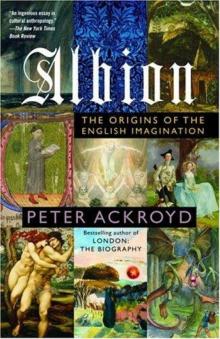 Albion: The Origins of the English Imagination
Albion: The Origins of the English Imagination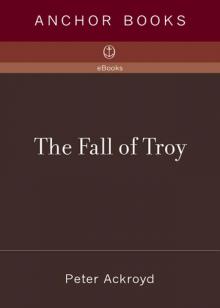 The Fall of Troy
The Fall of Troy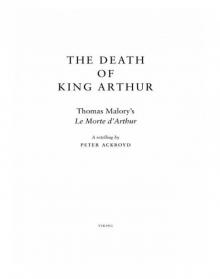 The Death of King Arthur
The Death of King Arthur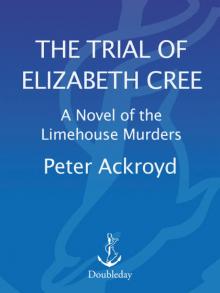 The Trial of Elizabeth Cree
The Trial of Elizabeth Cree London: The Biography
London: The Biography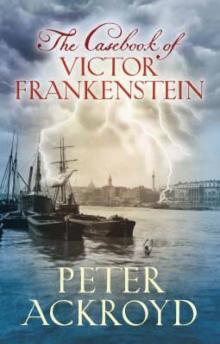 The Casebook of Victor Frankenstein
The Casebook of Victor Frankenstein Hawksmoor
Hawksmoor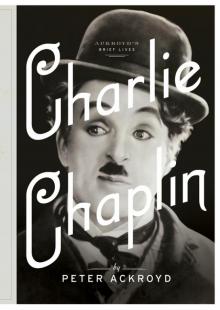 Charlie Chaplin
Charlie Chaplin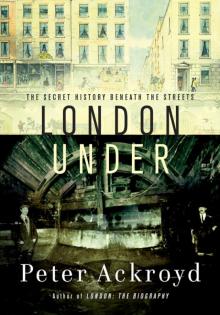 London Under
London Under